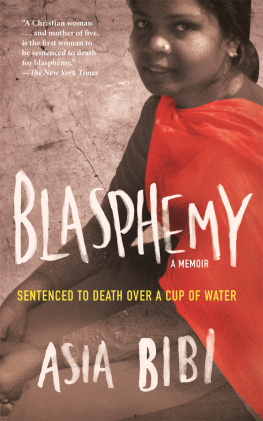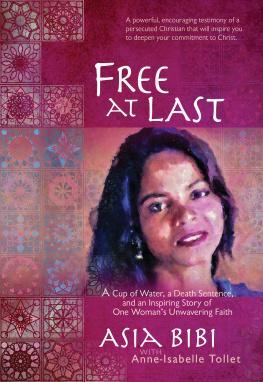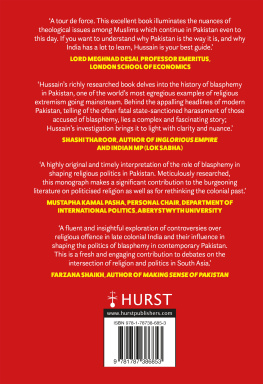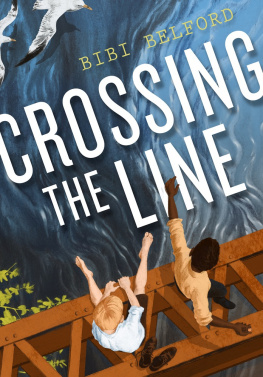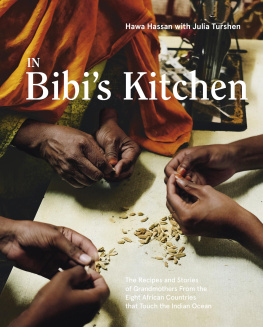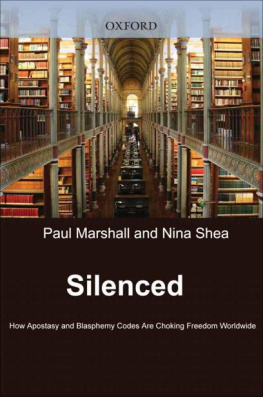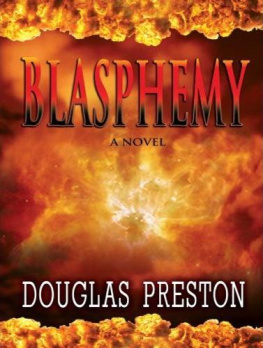Asia Bibi is currently in prison in Pakistan awaiting the result of her appeal against the death sentence she was given in 2009. Her family have had to go into hiding.
Copyright 2013, 2012, 2011 by Asia Bibi and Anne-Isabelle Tollet
First published in the United Kingdom in 2012 by Virago Press
Copyright 2011 by Oh! Editions. All rights reserved.
This edition published in 2013 by Chicago Review Press, Incorporated
All rights reserved
Chicago Review Press, Incorporated
814 North Franklin Street
Chicago, Illinois 60610
ISBN 978-1-61374-889-3
Some names within the text have been changed.
Cover photo from Asia Bibis collection. All rights reserved.
Typeset in Bembo by M Rules
Printed in the United States of America
5 4 3 2 1
Contents
Preface
This is the true story of an extraordinary friendship between two very different women, brought together as a result of human cruelty.
I am a French journalist for an international news channel and spent three years, 20082011, living in Pakistan. Asia Bibi is a Pakistani wife and mother living under sentence of death. Since 2009 she has been in prison in Sheikhupura, in the province of Punjab, where she is held in appalling conditions unworthy of a democracy. Her crime? Shes a Christian who drank a cup of water from a well used by her Muslim friends. This story sounds unlikely, but it really is true. Asia was arrested, tried and sentenced to hang for the crime of blasphemy. Since then, she has never stopped proclaiming her innocence from the depths of her windowless prison cell.
I was never allowed to visit Asia in prison, but despite this we got to know each other very well. Without ever meeting, or talking directly, we were able to form an unbreakable friendship.
I first came across Asia Bibis name in the local Pakistani press, the day after she was sentenced to death in November 2010. With the support of my friend Shahbaz Bhatti, then Pakistani Minister for Minorities, I did a number of reports on her case for various television news programmes. At that time Asias family were living under Bhattis protection, and he enabled me to meet them. For a few days Asias case shocked the world - and then it was forgotten. It was at this point that I realised that the only way to help her was to write a book.
Before starting, I talked the whole thing over at great length with Asias family, her lawyer and Shahbaz Bhatti, who, as well as being Minister for Minorities, was also a Christian, later murdered by the Taliban, on 2 March 2011, for his public support for Asia. We all came to the same conclusion: Asia was in an impossible situation, she had been sentenced to death by her own country, there was a price on her head and her family were in hiding, also threatened with death by religious fanatics. This book could save her.
But for Asias version of events to be heard beyond the walls of her cell, we had to take on the Pakistani authorities, who didnt want her story to be known outside Pakistan and were fiercely opposed to the idea that I should meet her. They were horrified by the prospect of a French woman taking an interest in this wife and mother walled up alive in a filthy cell in the Punjab. No, no one must hear Asia Bibi proclaim her innocence as she waited in appalling conditions for her own execution.
Though we were not allowed to meet, I was not prepared to give up the idea of writing this book. So I managed to talk to Asia through her husband Ashiq, who is the only person apart from her lawyer allowed to visit her in prison, once a week. For two months I would wait for Ashiq at the prison gate and there, with the help of an UrduEnglish interpreter, he would tell me Asias answers to my questions.
In this roundabout way Asia and I developed a special understanding that goes far beyond ordinary friendship.
She was the voice, I was the pen.
My manuscript was read to Asia in prison by her lawyer in a series of visits. This had to be done in total secret, as even the idea of this book was dangerous in Pakistan. Hearing her story read out made Asia very happy. To show her enthusiasm she asked her lawyer to sign every page of the book, as a mark of her total approval. Her dark, filthy cell was lit by a glimmer of hope.
Asia Bibi is the only woman this century to have been condemned to death for blasphemy. Her lawyer appealed against the decision, but until the date for the hearing is set by the High Court in Lahore, Asia risks being murdered at any time, or simply dying of exhaustion. A mullah in Peshawar has offered a reward of 5,000 euros to anyone who kills Asia. This sum is a fortune in Pakistan.
Asias case has shed light on Pakistans blasphemy law, which has seen thousands of innocent people sentenced to prison for reasons that have nothing to do with religious discrimination. It is vital to stress that most victims of this law are Muslims.
The law against blasphemy is unjust. It is used to settle disputes between neighbours or to get rid of a rival simply by making an oral accusation against them.
Through no fault of her own, Asia Bibi has become a symbol of this law. The fanatics are doing all they can to keep the law in place and have turned the case of this powerless young woman into a challenge to the government.
Yet we all know that the Islam advocated by the fundamentalists bears little resemblance to the great religion upheld by Muslims for centuries. In surat 5 of verse 32, the Koran teaches that anyone who kills an innocent person kills all humankind, and anyone who saves a life saves all humankind.
Asia Bibi is innocent. The Pakistani government knows this, but does nothing for fear of reprisals. In 2010 Pakistan ratified the International Covenant on Civil and Political Rights. Yet in refusing to act and to pass the necessary reforms, the state has become an accomplice of the fundamentalists. The countrys international undertakings are not compatible with keeping the crime of blasphemy on its statute books.
Pakistan is a great nation and Pakistanis are great people. They are friendly and hospitable and the Islam they follow is a religion that welcomes others, as I know from my own experience. In a population of 180 million, there is only a handful of extremists. But, by instilling terror, those few extremists are holding back the development of the entire country. I am glad that, by giving lectures throughout the world, I am able to give a voice to civil society in Pakistan, to the many people and groups who are currently unable to speak freely without fear of attack. If we manage to free Asia, we will be helping others unjustly imprisoned by this law.
Today Asia Bibi no longer has a lawyer; no one dares represent her for fear of being killed.
This book is now her only hope of survival. But time is passing, her health is deteriorating, her husband risks being killed every time he visits her and her children cannot see their mother for their own safety. So her husband and five children are also suffering from the accusation of blasphemy. They are all living with the threat of death and have gone into hiding, frequently moving house and unable to go outside or to work. The children miss their mother badly and have stopped going to school for their own safety. The youngest is only ten years old.
Through this book, which provides them with royalties, Asia now has enough to eat and her disabled daughter is able to receive costly medical treatment.
When you read this book you will understand that Asia Bibi is not just a symbol, but a real, generous woman, forty-two years old and the mother of five children. Her sixteen-year-old daughter Sidra says, Our life stopped when Mum went away. My sisters and I cry every day because we miss her so much. We dont know if she will ever come back; were very afraid of what might happen. Sidras face is worn by anxiety. She cant understand why her family has become the target of so much hate. Weve always had Muslim friends; being Christians was never a problem for us and weve always respected Islam. I want to be a doctor but since Mums been in prison weve had death threats too and I cant go to school.
Next page
